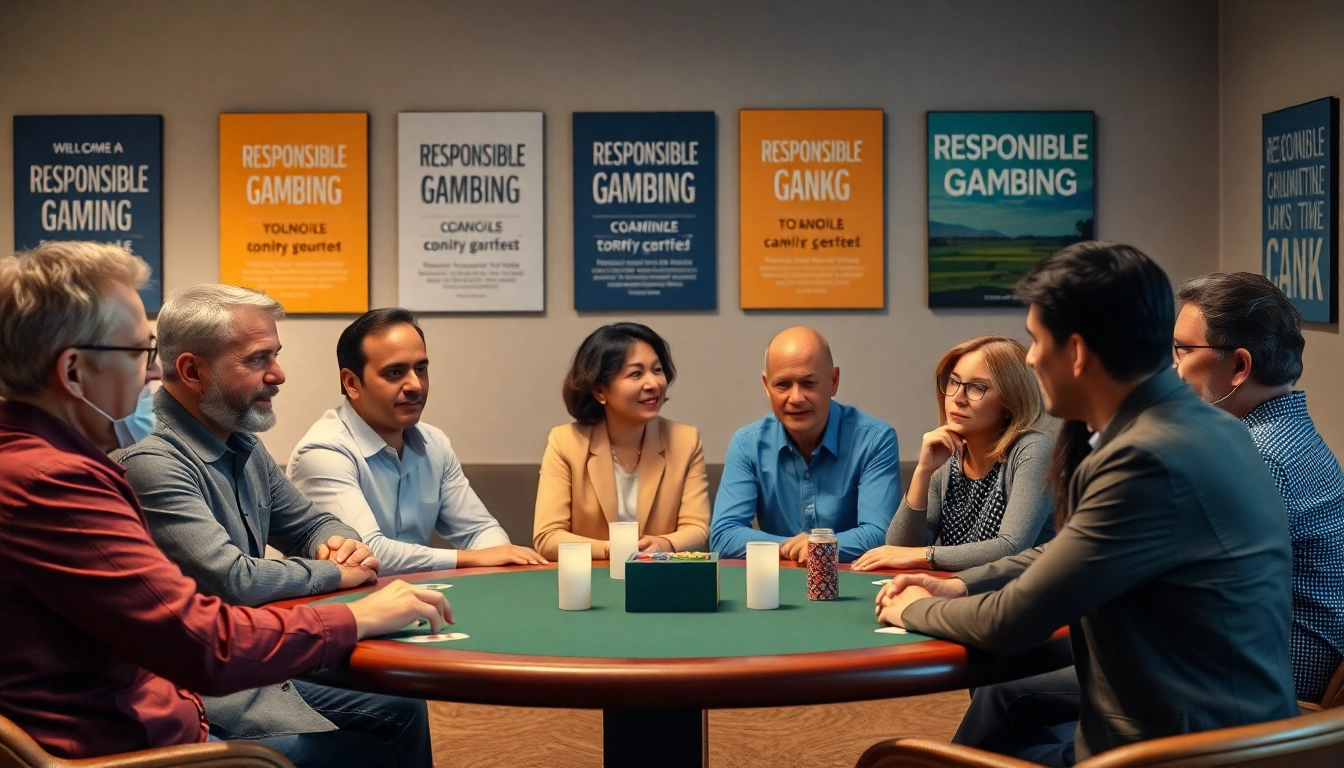Introduction to Responsible Gambling
Definition and Importance of Responsible Gambling
Responsible Gambling refers to the practices and principles that ensure gambling activities are conducted safely and sensibly, minimizing the risks associated with unhealthy gambling behaviors. It emphasizes the need for individuals to make informed decisions about their gambling habits, promoting voluntary limits and providing access to resources that support healthy engagement within the gambling landscape. In an ever-evolving industry, Responsible Gambling stands as a cornerstone of a sustainable gambling environment, fostering a culture of safety and well-being among participants.
The Impact on Individuals and Society
The impact of gambling on individuals can vary significantly based on personal circumstances, psychological predisposition, and external pressures. For some, gambling can provide entertainment and social engagement, while for others, it may lead to addiction, financial distress, or emotional turmoil. The societal implications are broadly felt, with communities sometimes suffering from the fallout of gambling-related issues, including increased crime rates, family breakdowns, and mental health crises. Fostering a culture of responsible gambling can mitigate these risks, providing tools and strategies that encourage safer gambling practices and enhance awareness of potential pitfalls.
Historical Context and Evolving Practices
The history of gambling stretches back centuries, but the need for responsible gambling practices has gained heightened attention in recent decades. Initially, gambling was often unregulated, leading to countless cases of addiction and societal harm. However, as awareness of these issues grew, lawmakers and industry stakeholders recognized the necessity of implementing policies and strategies to promote responsible gambling. Today, this evolution includes mandatory self-exclusion programs, educational initiatives, and the development of technology-driven tools that assist players in monitoring their gambling behavior and setting limits based on their needs.
Key Principles of Responsible Gambling
Transparency and Accessibility of Information
One of the foundational principles of responsible gambling is transparency. Individuals should have access to clear, accurate information about the risks associated with gambling, the odds of success in various games, and the resources available for help. Accessible information empowers players, enabling them to make informed decisions and set appropriate limits. Efforts to enhance transparency can include comprehensive Gamblers’ Information Portals, detailed FAQs, and communication that demystifies gambling processes, thereby improving user experience and safety.
Limit Setting and Self-Exclusion Strategies
Setting personal limits and utilizing self-exclusion strategies are critical components of responsible gambling. Players should feel empowered to establish boundaries regarding the time and money they are willing to spend on gambling activities. Moreover, effective self-exclusion programs allow individuals to voluntarily restrict access to gaming platforms for a defined period, acknowledging that reaching out for support is a strong and positive step. Operators can support these practices by providing user-friendly tools that encourage players to set limits easily and transparently, reinforcing positive gambling behaviors.
Responsible Advertising and Promotion
Advertising plays a significant role in shaping perceptions of gambling, and thus, responsible advertising is essential in promoting healthy gambling attitudes. This involves being honest about the potential for financial loss and the odds of winning, avoiding glamorization of gambling, and ensuring that promotions do not target vulnerable populations or reinforce harmful stereotypes. By adhering to clear ethical standards, advertising can contribute to a more informed consumer base and help maintain the integrity of the gambling industry.
Common Misconceptions about Responsible Gambling
Myths vs. Facts in Gambling
Several myths persist regarding gambling, often leading to misunderstandings about the nature of risk and reward. Common misconceptions include the belief that gambling systems can guarantee wins or that only “problem gamblers” can suffer from gambling-related issues. In reality, the odds are always against players in any form of gambling, and the perception of control can create dangerous illusions. By clarifying these myths and providing fact-based education, players can better understand the nature of gambling and avoid common pitfalls.
Understanding Randomness and Odds
Understanding the concepts of randomness and odds is vital for responsible gambling. Many players misconstrue how games operate, often believing that patterns or streaks can predict future outcomes. In truth, most gambling activities, especially those based on chance, are fundamentally random. Educating players about odds and the role of luck can enhance their understanding and reinforce the importance of viewing gambling as a form of entertainment rather than a steady income source.
Addressing Stigma and Discrimination
Misinformation and stereotypes can foster stigma surrounding gambling and those who experience problems related to it. This stigma often prevents individuals from seeking help for fear of judgment or discrimination. Promoting open dialogues about gambling, along with sharing personal stories that humanize the experience, can help dismantle negative perceptions and encourage a more supportive atmosphere. Acknowledging the challenges around gambling and fostering inclusive conversations can lead to a cultural shift that prioritizes empathy and understanding.
Implementing Responsible Gambling Programs
Best Practices for Operators and Players
Operators have a crucial role in the promotion of responsible gambling. Best practices include training staff in recognizing signs of problem gambling, providing customers with resources and support options, and promoting responsible gambling messages in all customer interactions. For players, actively engaging with responsible gambling tools, such as limit settings and self-assessments, significantly contributes to healthier gambling behaviors. Collaboration between operators and players is key to fostering an environment that supports responsible engagement.
Tools and Resources for Effective Management
Numerous tools are available for both operators and players to assess and manage gambling behaviors effectively. These include self-assessment questionnaires, budgeting tools, and access to support helplines. Additionally, technology has introduced innovative solutions, such as apps that help gamblers track their spending and establish limits in real time. These resources not only empower players but also help operators demonstrate their commitment to responsible gambling practices.
Case Studies of Successful Initiatives
Examining successful case studies in implementing responsible gambling initiatives is invaluable. Programs that offer extensive training for staff, create user-friendly self-exclusion options, and invest in community education have shown significant improvements in player well-being and reductions in risky gambling behaviors. These case studies serve as models from which other operators and stakeholders can learn, enabling a collective effort towards fostering a culture that prioritizes responsible gambling.
Measuring the Effectiveness of Responsible Gambling Strategies
Establishing Metrics and KPIs for Success
Measuring the effectiveness of responsible gambling initiatives requires the establishment of clear metrics and key performance indicators (KPIs). Metrics such as the rate of self-exclusions, participation in responsible gambling programs, and reductions in gambling-related harm provide insights into the impact of implemented strategies. Additionally, tracking customer feedback and satisfaction levels can inform adjustments and improvements, allowing for a responsive approach to program performance.
Analyzing Data and Making Adjustments
Ongoing analysis of collected data is critical for refining responsible gambling programs. By identifying trends and areas for improvement through comprehensive data review, operators can adapt strategies effectively to meet the needs of their players. This proactive approach to data analysis not only enhances responsible gambling initiatives but also builds confidence among players that the industry takes their well-being seriously.
Future Trends in Responsible Gambling Practices
The future of responsible gambling practices is poised for growth and evolution, with the integration of advanced technologies playing a central role. Artificial intelligence, machine learning, and big data are increasingly utilized to monitor gambling behaviors and identify at-risk players. As the landscape continues to shift, collaboration between stakeholders, including operators, players, and regulatory bodies, will be essential in fostering a robust framework for responsible gambling that adapts to changing consumer behaviors and expectations.



